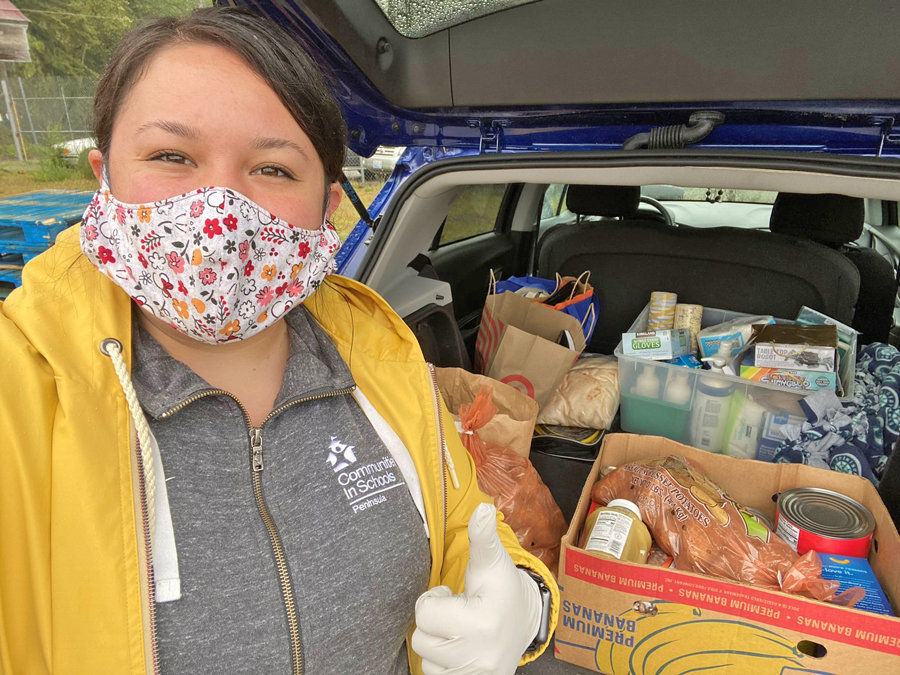
Communities in Schools of Peninsula, whose mission is to identify at-risk students and surround them with a community of support, has been serving students on the Key Peninsula and in Gig Harbor for nearly two decades. With 135 volunteers and a site coordinator at each school, most of what CISP does is school-based. When the pandemic closed schools in March 2020, the organization had to adjust quickly.
“Our first response was ‘How are we going to serve these kids who need our help more than ever?’ ” said Cathy Rich, volunteer coordinator and communications director. “The site coordinators really had to pivot. The needs are still there. The biggest concerns right away were food insecurity, clothing, school supplies, and helping parents struggle through the basics of internet access.”
Over the last 10 months CISP has continued to meet its mission, deepened and broadened its community partnerships, kept its volunteers connected and engaged, and planned how to adjust when schools fully reopen, according to Rich.
The immediate concerns were food insecurity and internet access. “We leveraged our partnerships with other organizations,” she said. “We needed to help each other because we couldn’t bring in our own volunteers.” Food Backpacks 4 Kids set up food distribution sites, and CISP site coordinators joined to help distribute food to families who did not have transportation.
Site coordinators distributed clothes, helped school staff assemble class packets and coordinated with Two Waters Arts Alliance to distribute art kits. They connected with non-English speaking parents. And they became digital navigators, working with families who needed assistance accessing internet services.
“It was a collaborative effort. We didn’t want to duplicate services,” Rich said. “Once we got the basics going, we could start to work on mentoring and tutoring.”
Rich said that parents were struggling with the stress of school closures. Kirsten Roberts, the Vaughn Elementary School site coordinator and a certified Positive Discipline parent educator, responded and began teaching classes for parents online, available free to anyone.
Over the summer, CISP ran a virtual reading club and started a pen-pal program. Volunteers who were already matched with students exchanged letters. This winter the popular Tutors with Tails program went online. (See “Tutors with Tails Help Young Readers at Vaughn Elementary,” KP News, Jan. 2020)
In September, the Operation Education program, a collaboration with the Red Barn Youth Center, Children’s Home Society and KP School Bus Connects, opened its doors. Every Monday and Tuesday more than a dozen students from Key Peninsula Middle School and Peninsula High School who have unreliable or no internet access come to the Red Barn in Key Center. Staff from CHS and CISP work with the students each morning, and Red Barn provides the building, box lunches and supervision in the afternoon. Buses provide transportation for those who need it.
Over the holidays CISP worked with the Interact Clubs of all three area high schools to collect blankets and socks for families. “Our entire office looked like Target. We had 150 blankets and 3,000 socks. It was heartwarming.” Rich said. They also coordinated with the St. Anthony Hospital auxiliary group and the Gig Harbor Rotary and Kiwanis for a gift drive. They worked with the Gnosh food truck and FB4K to supply meals for 40 families at Thanksgiving and 60 at Christmas.
CISP’s annual fundraising event, held in November, was a virtual affair this year, and though they were uncertain how it would go, Rich said it was their most successful ever. “I think people really want to help and since they can’t come in as volunteers, they can help with money. I hope it continues. The needs are not going to go away.”
The pandemic, Rich said, made it clear that in times of crisis the system doesn’t support all people equally. “In my mind we are all learning that we need to go deeper to see why kids are not successful. Since the pandemic, we have wrapped our arms around more students, and we are more than ever working with the whole family. What we were already doing has been amplified.”
Executive Director Colleen Speer anticipates that the need for CISP services will increase when schools reopen, and that how they deliver those services will continue to evolve. They know that they will continue to be digital navigators, she said. If schools open with a hybrid model — combining in person with virtual classes — that will have an impact. “We work with each child, one at a time, depending on their circumstances. Because we are small, we can pivot pretty quickly,” she said.
UNDERWRITTEN BY THE FUND FOR NONPROFIT NEWS (NEWSMATCH) AT THE MIAMI FOUNDATION, THE ANGEL GUILD, ADVERTISERS, DONORS AND PEOPLE WHO SUPPORT INDEPENDENT, NONPROFIT LOCAL NEWS